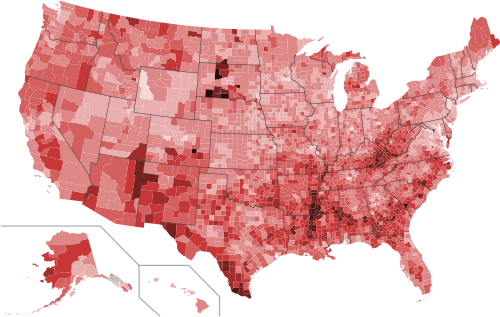 |
| US poverty map |
I'd skimmed the New York Times article on the disappearing American middle class, but I didn't go back and read it carefully until I came across this summary:
Apple doesn't build iPhones in the United States, in other words, because there is no longer an ecosystem here to support that manufacturing. There's no supply chain, there aren't enough super-low-cost workers, and there are not enough mid-level engineers. And many Americans looking for work are still hoping for a return to jobs, salaries, and lifestyles that have simply disappeared.Uh oh. This might help to explain this Sunday's ominous statement from the Bank of Canada's Mark Carney:
It’s going to take a number of years before they get back to the U.S. that we used to know — in fact, they are not, in our opinion, ultimately going to get back to the U.S. that we used to know,” he said.
Hold that thought.
It reminded me of something unsettling I read a while back—a pensive piece authored by former Intel chairman Andy Grove:
I fled Hungary as a young man in 1956 to come to the U.S. Growing up in the Soviet bloc, I witnessed first-hand the perils of both government overreach and a stratified population. Most Americans probably aren't aware that there was a time in this country when tanks and cavalry were massed on Pennsylvania Avenue to chase away the unemployed. It was 1932; thousands of jobless veterans were demonstrating outside the White House. Soldiers with fixed bayonets and live ammunition moved in on them, and herded them away from the White House. In America! Unemployment is corrosive.
As I reflect on Carney's unsettling comment from yesterday, I worry about the future of the American middle class, not least because their well-being is intertwined with Canada's.
Sure, some U.S. real estate is becoming more affordable for well-off Canadians, but do the long-suffering citizens of Vancouver, BC really want to move to a country where the water in several large metro areas may already be running out?
And what about our erstwhile trading partner China, with its dangerously skewed demographic profile? Is it Canada's turn next?
At a Chinese New Year's banquet I attended last night, one of my dinner companions remarked that "something feels awfully off-balance in the world today."
Indeed.
No comments:
Post a Comment